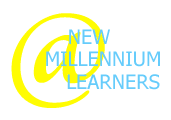If you have been following my live tweets today you will know that day 1 of the "New Millenium Learners Conference 2010" taking place here in Vienna at the moment was really interesting.
The opening session led by people from the Austrian Ministry of Education introduced some of the projects that the Ministry has been working on in Austria. Our small Austrian OLPC project in Graz was also mentioned but unfortunately due to time constraints the information on all the projects remained relatively superficial.
The first presentations focused on "Opportunities and risks of 1-to-1 in education: international perspectives" with the speakers being Carla Jiménez (IDB), Michael Trucano (The World Bank) and Francesc Pedró (OECD). All speakers gave interesting overviews on what their respective views of the current state of 1:1 computing in education were. What I particularly liked was Michael Trucano ending with leaving the last of the 10 points he structured his talk around open to emphasize that there are still many unknowns and questions to be discussed when it comes to these kinds of initiatives.
The first real session "Monitoring use and results: how countries know what is going on in the terrain?"
To me the most interesting presentation there was undoubtably the one by Oscar Becerra from Una laptop por niño in Peru. Some key pieces of information which so far had been hard to confirm were discussed:
- Currently 300.000 children in Peru have an XO-1, 10.000 teachers have been trained and 6.000 schools have received XO-1s. At the end of the year Peru wants to increase these numbers to 600.000, 100.000 and 20.000 respectively!
The lunch break was spent hanging out with various people involved with OLPC and discussing some of the ongoing efforts and projects and ideas for future events and undertakings.
The second session was called "Supporting users: how teachers and pupils are supported?"
Here I found all four panelists to present very interesting projects going on in Argentina, Catalunya, Portugal and across various countries of the European Schoolnet. One thing I'll have to follow-up on is a promising report called "Insight Report, 2010" which the European Schoolnet hopes to publish over the coming weeks.
This session resulted in some interesting follow-up discussion with good questions from the audience and the session chair. One of the key takeaway from this session for me was the phrase that "learning resources go beyond content".
The third and last session of the day was "The policy expectations: why countries are investing on 1-to-1?" and included presentations about projects in Maine (probably the most famous 1:1 computing in education project), Uruguay, Portugal and Canada. Additionally Rodrigo Arboleda from the Miami based OLPC Association presented his view of things.
To me the most interesting slide of that session was a list of findings with results from a 1:1 notebook project in New Brunswick:
- Empowers students
- Engages students (and teachers)
- Personalizes learning
- Improves student achievement
- Promotes inclusive education
- Enables and accelerates the 21st century shift
I hope that as 2010 progresses we'll see similar results from surveys and evaluations of OLPC projects around the world.
One thing I was generally a bit surprised about is that there was relatively little disagreement during the panel discussions, by and large most participants seemed to agree on the majority of issues and topics mentioned.
In-between the sessions there was plenty of time to socialize and talk to the various conference participants including some of the core OLPC folks who arrived in Vienna coming from Brussels, Miami, Boston, New York and Kigali.
I managed to livestream and record almost all the sessions via ustream. Just head over to my ustream.tv page and look at the "archived videos" to find the recordings there. A handful of people are also twittering from the conference and you can find these tweets by searching for the #1to1Viena hashtag.
Overall I have to say that I really enjoyed day 1 as I learned a lot and got to talk to many people I hadn't seen in many months (or even years) plus of course I met many new people. Now I'm already looking forward to tomorrow which will focus on the theme of "Benefits and barriers. Research evidence and gaps." but first I'm off to the "Welcome Reception" by the Austrian Ministry of Education and the City of Vienna...


